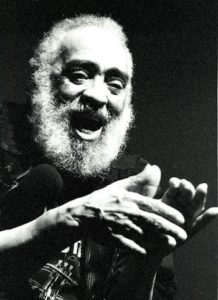
Oscar Brown Jr.
Oscar Brown, Jr., was born on this date in 1926. He was a Black actor, director, playwright, songwriter, lyricist, activist, essayist, and television host.
Born at Chicago’s Provident Hospital, Oscar Cicero Brown, Jr. was the first child of Helen, a schoolteacher, and Oscar Brown, Sr., a prominent lawyer and real estate owner. He was raised in a two-church household: St. Edmond’s Episcopal Church and Pilgrim Baptist Church. He attended Willard Elementary and Englewood High Schools. By age 15, he had honed his elocution skills in Studs Terkel's children's radio series.
Brown was only 16 when he enrolled at the University of Wisconsin in 1943. After attending several colleges and universities, including Lincoln University (PA) and the University of Michigan, where he excelled in English composition but failed everything else, he pursued creative writing.
In his 20s, he returned to work in radio, spending five years as the “world’s first Black newscaster” for a Chicago program called “Negro Newsfront,” where he also managed to include a musical menu, as well as poetic works by Countee Cullen and Langston Hughes.
In addition to his media work, he continued to dabble in real estate, advertising, and public relations, but he soon turned to activism. In 1948, Oscar ran for the Illinois Legislature on the Progressive Party ticket and for the U.S. Congress as a Republican in 1952. From 1948 to 1950, Brown played a key role in Richard Durham’s “Destination Freedom” Black Radio Days series. He was a member of the Communist Party from the time he was 20 to his resignation in 1956 when he concluded that he was “just too black to be red.”
He served two years in the Army and began composing songs and singing. The turning point in his career came around 1960. The Brown family was a neighbor of the playwright Lorraine Hansberry’s family. He met Hansberry’s husband, Robert Nemiroff, who worked for a New York-based music publishing company. Nemiroff, in turn, introduced Brown’s music in New York, which led to a recording contract with Columbia Records and the recording “Sin and Soul.” The Los Angeles Times described it as “a mosaic of poetic and musical images [with] lyrics for such popular jazz instrumentals as Nat Adderley's "Work Song," Bobby Timmons' soul-jazz tune "Dat Dere" and Mongo Santamaria's "Afro Blue" and "Bid 'Em" recorded by Mahalia Jackson and Lena Horne.
Brown performed at the Village Vanguard and with Miles Davis, Aretha Franklin, John Coltrane, Dizzy Gillespie, Nancy Wilson, and Cannonball Adderley. He also composed the lyrics for Davis’ “All Blues, and collaborated with Max Roach on “Freedom Now Suite.” His magnum opus came in 1961 with the production of “Kicks & Company,” directed by Hansberry and co-produced by Nemiroff.
Backer's auditions and fund-raising activity reached a new level when Brown appeared on NBC’s “Today Show” and raised over $400,000. After this, his one-man show, “Oscar Brown Jr. Entertains,” in London ran for two years. During this time, Brown met and married singer/dancer Jean Pace.
They moved back to Chicago, where, within a year, they developed three more musicals: “Summer in the City,” “Lyrics of Sunshine and Shadow,” and “Opportunity Please Knock.” “Opportunity Please Knock” was produced in 1967 by the Blackstone Rangers gang. Their work with the gang resulted in the pair being invited by Mayor Richard Hatcher to Gary, IN, in 1968. Among their “discoveries” were The Jackson Five and actor/singer Avery Brooks.
Brown and Pace moved to San Francisco the following year, where Oscar Brown turned the comedy production “Big Time Buck White” into a musical, which ran briefly on Broadway with Muhammad Ali in the title role. Brown and his wife also joined Brazilian musicians Luiz Henrique and Sivuea in the production of “Joy 69,” which ran for over a year in San Francisco, New York, and Chicago. During the 1970s, Brown was artist-in-residence, directing his works at Howard University in Washington, D.C., Hunter College in New York, and Malcolm X College in Chicago. Brown premiered a musical drama entitled "Slave Song," written in iambic pentameter and rhymed quatrains.
By 1975, Brown hosted the 13-week PBS program “From Jump Street: The Story of Black Music” and was a regular actor on “Brewster Place.” He acted in episodes of “Roc” and the PBS special “Zora Is My Name.”
Oscar Brown, Jr., has composed over a thousand songs and a dozen full-length theater pieces. In 2004, Brown opened "Jazz at Lincoln Center” in New York, and in 2005, he celebrated the premiere of Donnie Betts’ "Music is My Life, Politics My Mistress." He also made several appearances on Def Poetry Jam and was a Regents Professor at the University of California at Riverside.
Oscar Brown, Jr. died on May 29, 2005, in Chicago. He is survived by his wife, Jean; his son, Napoleon; his daughters Donna, Iantha, Maggie, and Africa Pace; and 16 grandchildren and four great-grandchildren.
Heart & Soul:
A Celebration of Black Music Style in America, 1930-1975
by Merlis Davin Seay, Forward by Etta James
Copyright 2002, Billboard Books
ISBN 0-8230-8314-4